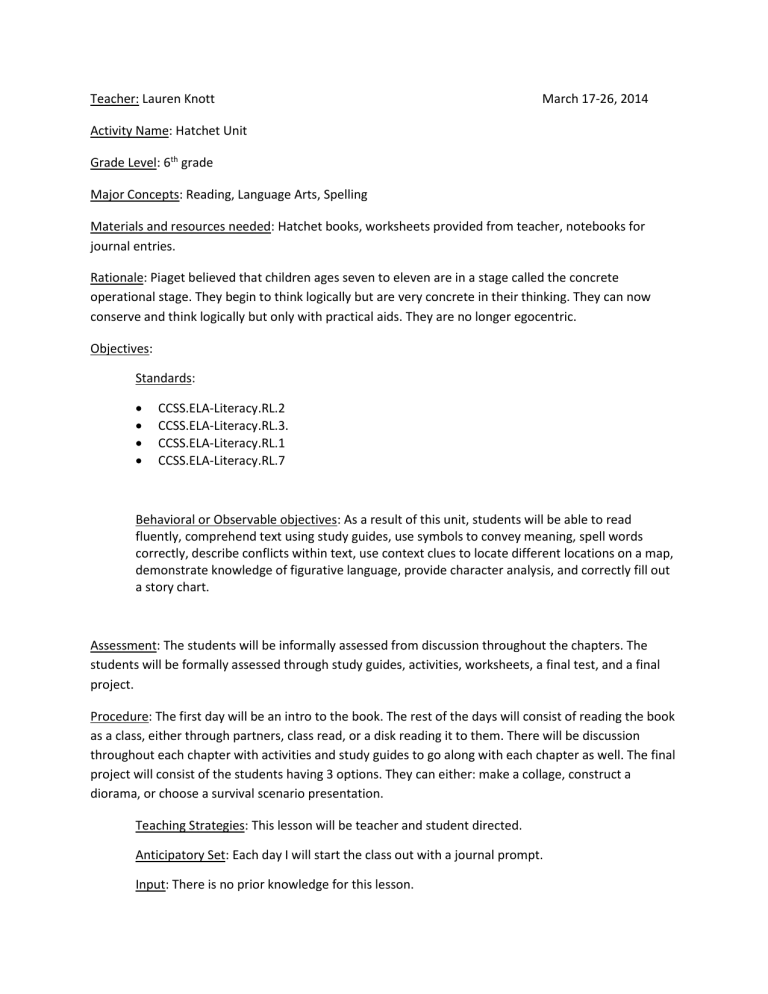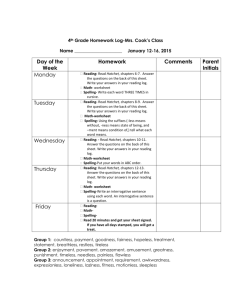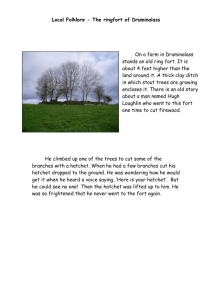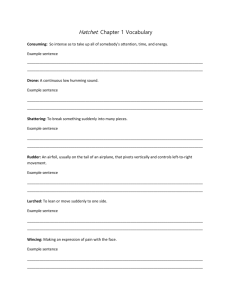File

Teacher: Lauren Knott
Activity Name: Hatchet Unit
Grade Level: 6 th grade
March 17-26, 2014
Major Concepts: Reading, Language Arts, Spelling
Materials and resources needed: Hatchet books, worksheets provided from teacher, notebooks for journal entries.
Rationale: Piaget believed that children ages seven to eleven are in a stage called the concrete operational stage. They begin to think logically but are very concrete in their thinking. They can now conserve and think logically but only with practical aids. They are no longer egocentric.
Objectives:
Standards:
CCSS.ELA-Literacy.RL.2
CCSS.ELA-Literacy.RL.3.
CCSS.ELA-Literacy.RL.1
CCSS.ELA-Literacy.RL.7
Behavioral or Observable objectives: As a result of this unit, students will be able to read fluently, comprehend text using study guides, use symbols to convey meaning, spell words correctly, describe conflicts within text, use context clues to locate different locations on a map, demonstrate knowledge of figurative language, provide character analysis, and correctly fill out a story chart.
Assessment: The students will be informally assessed from discussion throughout the chapters. The students will be formally assessed through study guides, activities, worksheets, a final test, and a final project.
Procedure: The first day will be an intro to the book. The rest of the days will consist of reading the book as a class, either through partners, class read, or a disk reading it to them. There will be discussion throughout each chapter with activities and study guides to go along with each chapter as well. The final project will consist of the students having 3 options. They can either: make a collage, construct a diorama, or choose a survival scenario presentation.
Teaching Strategies: This lesson will be teacher and student directed.
Anticipatory Set: Each day I will start the class out with a journal prompt.
Input: There is no prior knowledge for this lesson.
Model: I will read certain parts of the book to them, demonstrating fluency.
Check for understanding: I will informally check for understanding by stopping throughout the book to ask the students questions that pertain to each chapter.
Guided Practice/Independent Practice: The guided practice for this unit will consist of class discussion throughout the book. Independent practice will consist of the students reading the book for themselves, as well as filling out study guides and other worksheets.
Closure: Each lesson will close with a thought for the students. I will give them a question to think about as they read the next chapter. Students will also have to finish up the next section of assigned pages.
Modifications for special needs or cultural differences: A couple of the days I will have a disk that reads the book to them for students who have trouble with reading fluency.
Hatchet Day 1 (March 17 th )
Intro: I will begin with a group activity.
Activity: I will put students in groups of 3. I will give them a scenario. I will tell them to imagine they are stranded on an island. As a group, they need to come up with 2 things: if they had to choose 5 items to have with them, and what’s the first thing they would when they landed on the island. They will have
10-15 minutes to discuss this as a group, and then everyone will present it to the class.
Next, we will make a KWL chart of surviving in the wilderness. I will start the chart with writing an idea of mine on the board first. Then, students will individually come up and add to the chart. This will introduce the students to the book Hatchet. I will then explain that we will be reading a book about a boy who is on a plane and crashes into the Canadian wilderness.
Before we begin reading, I will give the students a pretest of Hatchet. I will use the same test at the end of the unit to show improvement. Then, we will begin reading, but the students will get to listen to a disk reading of the book. Students will be given a chapter 1 and 2 study guide to fill out either while they are reading or after. Students will be given a map activity to try to locate Brian’s location from clues the book provides. Students will also be given a spelling list from the book that they will have a pretest on tomorrow. If time allows, we will go over the definitions of the words.
Close: Depending on how far we get, students will need to finish reading chapter 1 and read chapter 2 as well.
Hatchet Day 2 (March 18 th )
Intro: Students will take the spelling pretest. Then they will be given a journal prompt to write down in their journals that I have selected. I will ask if anyone would like to share. Next, I will introduce the final project for Hatchet. They will have 3 choices and will have to choose 1. They can either: make a collage about Brian’s survival experience, make a diorama of a scene from the book, or choose a survival scenario and create a presentation about it. This project will be due the last day, March 26 or possibly
March 27 th .
Activity: We will review what happened in chapter 1 and 2, and clarify any questions students might have. Then we will begin reading chapter 3. We will either continue with the disk, or read as a class.
Students will be given the chapter 3 and 4 study guide to fill out while or after they read. They will also be given a character and conflict sheet to fill out as the information is provided throughout the book. These will be used as completion points.
Close: Students will need to finish chapter 3 and 4 on their own.
Hatchet Day 3 (March 19 th )
Intro: We will begin with a journal prompt I have selected. I will ask if anyone would like to share.
Activity: We will talk about figurative language. We will go over what a simile, metaphor, idiom, hyperbole, analogy, personification, onomatopoeia, irony, and pun are, giving examples. Students will be given a worksheet with lines from the book and they need to fill in the blank with what figurative language is being used. Next, we will review chapters 3 and 4 and clarify any questions. Then we will begin reading chapter 5. Students will be given the chapter 5, 6, and 7 study guides.
Close: Students will need to finish reading chapters 5-7.
Hatchet Day 4 (March 20 th )
Intro: First, students will take the spelling posttest that will be taken for a grade. Then, we will begin with a journal prompt I have selected. I will ask if anyone would like to share.
Activity: Students will be given a plot chart to fill out as we continue the book. We will need to review what each part of the chart is such as the rising actions, falling action, exposition, climax, conflict, and resolution. This sheet will also be used as completion points. We will review chapters 5-7 and clarify any questions. Then we will begin reading chapter 8. Students will be given chapter 9-11 study guides.
Close: Students will need to finish reading chapters 8-11.
Hatchet Day 5 (March 21 st )
Intro: We will begin with a journal prompt I have selected. I will ask if anyone would like to share.
Activity: We will review chapters 9-11 and clarify and questions. Then we will begin reading chapter 12.
Students will be given chapter 12-14 study guides.
Close: Students will need to finish reading chapters 12-14.
Hatchet Day 6 (March 24 th )
Intro: We will begin with a journal prompt I have selected. I will ask if anyone would like to share.
Activity: We will review chapters 12-14 and clarify any questions. Then we will begin reading chapter 15.
Students will be given chapter 15-16 study guides.
Close: Students will need to finish reading chapters 15-16
Hatchet Day 7 (March 25 th )
Intro: We will begin with a journal prompt I have selected. I will ask if anyone would like to share.
Activity: We will review chapters 15 and 16 and clarify any questions. Then we will begin reading chapter
17. There is no study guides for chapters 17-19, but this means students can review the material for the test tomorrow.
Close: Students will need to finish chapters 17-19. This will end our novel.
Hatchet Day 8 (March 26 th )
Intro: We will have an overall discussion about the book and what everyone thought of it. Study guides will be handed in for participation points.
Activity: Students will take the final test that will be graded over the book.
Close: Students will present their final projects to the class. I will grade these based on organization, effort, and creativity. We may only have time to present a few that volunteer.


